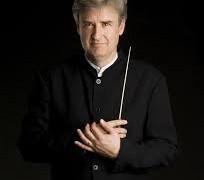The maestro who quit Seattle says he ‘felt threatened’ there
NewsThe Danish conductor Thomas Dausgaard, who resigned from the Seattle Symphony last weekend by email, has now told a New York Times reporter that the orchestra was ‘ruled by fear’.
‘I felt personally not safe,’ he said. ‘I felt my life is too precious to be in such tension.’
These are extraordinary charges and they are denied in their totality by the Seattle Symphony. There is no indepenent corroboration of Dausgaard’s impressions. The orchestra’s CEO Krishna Thiagarajan had a perfectly placid time at his previous post in Scotland.
It appears Dausgaard, 58, is under some form of stress.
Read the full disturbing NYT article here.






Well, Seattle is not a safe city anymore. I doubt his feeling unsafe is directly related to the symphony alone.
I doubt you have any evidence at all for your second claim. Classical musicians have always seemed remarkably unaffected by such issues – regularly working, even thriving in places like Cleveland, Detroit, Philadelphia, etc. far more dangerous than Seattle is now or has ever been.
Seattle is perfectly safe. Stop manufacturing fear. I work and live in Seattle. Never a problem. except cost of parking.
As someone who used to live in work in Seattle, I totally disagree. I left because the crazy-far-left city council has totally ruined what should be one of the most beautiful cities in America. Instead, it’s littered with homeless encampments and crime has indeed skyrocketed. In my case, a homeless man decided to make my patio his new home, and there was little the police could do about it. Each day I had to watch for the needles when I walked my dog. But sure, yeah it’s safe.
Complain? They’ll tell you they are the problem. I was basically told I was the problem. Enjoy your garbage pit. Stop being apologist and start making your city better.
Being that close to the HQs of Starbucks and Microsoft does that to people.
No. The conductor’s decision to leave has nothing to do with those corporations. Your comment is off-topic.
@TrueNorth: Irony not really your strong point, eh?
especially starbucks espresso.
i had a cup recently it was like
brown water.
Being close to the C.H.O.P. and the “Summer of Love” would have unsettled anybody.
The Seattle SO doesn’t operate during the summer and Dausgaard wasn’t even here during that time. And in any case the CHOP is like two miles from Benaroya Hall. Complete nonsense.
That’s a dumb comment. Both of these places regularly get stellar reviews for quality of work atmosphere.
If only he was a woman, an lgbtq person or just about anything else BUT a white hetero man. There would be no talk of ‘they deny it in totality!’ nonsense. Of course they deny it! What can they say, ‘yeah, he’s right. We’re kind of horrible to work with…’? Come on!
There were POC women who also felt unsafe and threatened under this administration who raised concerns that were also dismissed.
Well, I think it’s OK to say that, it happens often enough as I have been able to observe.
Sally
Seattle was notoriously a hornet’s nest of an orchestra for decades already. Dog Bites Man.
Wrong. Tell that to Ludovic Morlot, his predecessor and to Gerard Schwarz, who was there a long time and is, in my opinion, one of the most influential conductors around.
I heartily agree that Schwarz is a big talent and from his writing and radio work a terrific gent, but don’t you recall the slagging off that went on after his departure? One starts to get the impression that the atmosphere is a bit unhealthy — whatever the cause(s).
Gerry might be a great musician but he’s a terrible conductor. During his tenure, the Seattle Symphony was quite isolated, probably due to his own insecurities.
I think pre-Covid, the Board held all the cards in hiring and firing; post-Covid, MDs are much more vocal and pro-active about what they want out of life generally and out of the orchestra specifically, so if they are unhappy, they’ll walk.
Life is too short and unpredictable to waste a year in an unhappy situation.
Dausgaard serving out the last year of his contract in misery would have done nothing to enhance his career prospects (or his life), whereas the orchestra would’ve taken everything out of him and benefited financially and in terms of stability at his considerable mental health expense.
I’m not taking sides, I”m observing that people who can are making rational decisions.
Indeed it seemed Seattle‘s management was hostile to Dausgaard.
While all other European maestri could return much sooner to their US orchestras, Nelsons, Muti, Luisi, Honeck, FWM, …, during the silly US travel restrictions (open for professional sports people, closed for professional musicians, such barbarians…) it took them until two months ago to get Dausgaard the necessary ‚National Interest Exception‘???
Somebody at the very top of the management in Seattle either didn‘t do their job, or actively boycotted his return.
This article raises more questions than answers. Dausgaard ought to fire his publicist for this terrible quote which is likely to be misinterpreted or be interpreted accurately: “I felt my life is too precious to be in such tension”. The word “precious” just reeks of privilege.
Look, here’s the word on the street from a credible source: Dausgaard didn’t like wearing a mask while conducting, part of the rules stipulated by the orchestra. Because he was “suffering the effects of wearing a mask”, he handed off all of the rehearsals to an assistant or cover conductor. He then asked to take over for the performance at the eleventh hour. The CEO (Krishna Thiagarajan) refused to allow this.
I’m not sure that should be in his wheelhouse to decide, as even though that’s a bad call by Dausgaard if true, it should be left to the music director and within his authority. Depends what else was going on, I suppose. I can see where that’s a breach of autonomy that could merit a resignation on principal, although without knowing what’s in the contract it’s hard to know whether that was stepping into the scope of duties.
Biggest question is the nonsense choice to hire Dausgaard as a music director from the beginning by the clueless board of directors. Pretty obvious that a music director for a major orchestra needs to be feet down on the ground in the community to do meaningful work. Shame on them. This is a lesson you could have gleaned from experience, but I’m sure they thought he’d be the exception.
And shame on the CEO and President Krishna Thiagarajan for then saying that he’s going to “engage local talent” and then reneging on that promise. The parade of conductors to replace Dausgaard is the former music director Ludovic Morlot and a bunch of diversity and inclusion candidates.
Someone needs to clean house in the rainy city.
Yes, I agree that the distribution of conductors’ work is decision within the purview of the music director (and perhaps artistic administrator) to decide.
Although, if true, deputizing all rehearsals would be an unwelcome return to bygone way of doing things.
He came from an environment where the arts, particularly orchestras, are state funded. No need to fundraise, participate in the community per se, or have the pressures of patron stewardship. I’m sure he felt pressured to present live concerts too. Which is still a risky activity. I agree, things were lost in the translation.
Maestro better start sniffing what he’s shoveling.
Ah yes… the bully cry baby is kicking and screaming to the NYT on his way out. Big surprise.
If anyone felt threatened it was the people Maestro mistreated at the SSO. Meetings with him were a nightmare.
Hold on while I get my tiny violin.
Don’t let the door hit you on your way out.
“the orchestra was ‘ruled by fear’.”
I thought is was conductors who instilled that fear. People like Szell, Reiner, Toscanini, Rodzinski. Who’s the orchestra bully in Seattle? (And the Emerald City is not a nice place to visit anymore…the “Summer of Love” was anything but.)
The SSO’s bully is Krishna Thiagarajan. He does indeed use fear, bullying and gaslighting among other tactics to ‘rule’.
There were many employees (former and current) who felt unsafe and threatened by this administration at the Seattle Symphony. Good on Dausgaard for sharing truth.
Completely true. The problem in this Orchester is the CEO. Hope it will be clear soon. Dausgaard did a phantastic job with his interprising programming and Grammy-nominated recordings
He was a problem in Scotland too. I suppose the band across town were all too happy to give him a decent reference…
It’s a shite band
I used to hold a similar opinion, but after listening to some of their newer recordings I’m convinced they are not a shite band. Maybe a similar tier to Nashville or Atlanta.
Not true about Scotland but it’s a testament to them how quiet they kept the internal discontent.
It is seen before that a failure in Europe suddenly gets a top job in the US. The present CEO of SSO has a very limited experience of running an orchestra. Hope the board will act in a right way towards this scandalous matter and change the CEO as soon as possible
Not as quiet as all that. But BBC orchestras are pretty much the only ones left in the UK (symphony orchs, anyway) where bosses can still impose chief conductors without regard for the musicians’ opinions.
NYT paywalled article archived at:
https://archive.is/1Tf55
Thank you. Much appreciated.
Would love to hear what Gerard Schwartz thinks about this.
I’ve been in that kind of workplace with control freak bosses and nasty back stabbing coworkers, but I’ve never had the kind of money and prestige to just walk away. The last place I worked at was so bad that it imploded and shut down. Luckily it wasn’t a musical ensemble, so it didn’t matter. Let’s hope Seattle can dump the bad managers and backstabbing bozos and get back on track.
Why are the talented ones always crazy?
Have you heard his recordings? Not that talented.
I have heard it (from someone close to the organization) to be a “hot mess” out there with the orchestra.
What does that even mean?
We are a long way from Toscanini aren’t we?
Unfortunately a very long way if you’re talking only about conducting talent.
The professional symphony orchestra at its best, with good leadership, is a creative hub nurturing its talent and greater than the sum of its constituent parts.
With psychopathic ambitious leadership, it becomes a poisonous paranoid pit of negativity.
Fish rot from the head down.
Which head, though? The CEO or the Music Director? I genuinely have no idea. Opinion in the comments seems split.
A bad MD appointment is more often than not a temporary inconvenience.
A clinical psycopath at the helm of the organisation is a systemic poison.
In my experience.
Lol. Who are you defending? That’s quite a statement to say that he is under some form of stress. It’s not actually news reporting – it’s opinionating. Did the Seattle Symphony send you a hearty donation??
Odd, isn’t it, that he didn’t mention this in his resignation email. I thought that was nonsense at the time and think this is too. He may be having mental problems.
The NYTimes link is for pay; this is not. https://www.seattletimes.com/entertainment/seattle-symphony-maestro-who-resigned-by-email-says-he-felt-not-safe/
Also important: the orchestra was not going to rehire him: “. In late November, the board privately decided not to renew his contract, which was to have ended after the 2022-23 season….” I suspect that is the real reason he broke his contract and quit. Good luck finding a new job. Sounds like a man with problems.
Quite the axe to grind you have. Did he attack you? What’s your real name I wonder? Your comments seem a little skewed and not based in reality.
Anyway, I’m quite sure he’s not going to have any troubles finding his next post. But you might.
Strange that a musician who claims covid regulations kept him away from work made an appearance in Seattle, then went to Denmark, had trouble getting back, got back in early November 2021, canceled a concertand THEN LEFT AGAIN IN LATE NOVEMBER FOR DENMARK. Shouldn’t he have known better and isn’t he hiding behind an excuse?
Frank Flambeau…..are you really Krishna?
Mr. Dausgaard LIVES in Denmark, with his family.
You don‘t expect someone contracted to work in Seattle for 12 weeks a year, so not working in Seattle for the other 40 weeks of the year, to set up residence there, including moving his family from a most liveable place like DK to a shit overpriced and unsafe place (for most) like the US, or do you?
What I wonder is, why Seattle management seemed unable to fly in their chief during Corona travel restrictions, while all other US orchestras (Boston, Chicago, Dallas, Pittsburgh, Cleveland…) seemed to succeed there.
So there is more of a story here. Seems to be more between conductor and board/management than with the players – compounded by COVID – but unfortunate nonetheless.
Anyone who has a common sense would feel personally threatened in a city that lawlessness is tolerated for idiotic political reasons.
I rejoice every day that my hometown orchestra is the Chicago Symphony. Next up for the hard working CSO is a program featuring Beethoven’s 5th and 8th symphonies. Paid concerts Thursday and Saturday, and a free community concert on Friday. The link at the bottom is to a promo for the CSO.
What makes the CSO “different”? It’s the expectations mindset of the musicians, individually and collectively, established in 1891 and maintained through the decades.
A musician who left Chicago to join another major U. S. orchestra (and then left that orchestra) found that the grass is not always greener. He summed things up as follows:
“There are fine musicians in ———-, but we have achieved a very strong common purpose and set of aims in Chicago that they do not have or do not yet have there.”
“They have no tradition there — no tradition of sound and no tradition of working together as a dedicated ensemble. Maybe they will have that someday in the future.”
https://www.youtube.com/watch?v=P5ZudKtIgTE
Yes, there is a tradition of quality and a particular sound in Chicago. Granted the brass aren’t what they were in the 80s (some may be pleased they’re toned down) but the string playing is much improved in the last 20 years. I know no other orchestra that is basically all on stage practicing for 30 minutes before each concert, then they go off and then they come back on for the concert. That’s a committed band and it’s been like that for years.
The CSO is far from the only orchestra where “culture” and “tradition” reside. Philadelphia’s sound and tradition have endured far longer even though it was founded after the CSO. There are other orchestras, as well….
I’ve been singularly unimpressed hearing them @ Carnegie Hall under Muti.
They are vastly superior to the NYP and have been so for close to a century now.
That’s quite ironic that you quote Mathieu Dufour, who said that about LA Phil, and then after briefly returning to Chicago promptly left for Berlin anyway. There’s been an exceptional exodus of first chair players in Chicago during Muti’s tenure. Not all is well in that house, as much as I love that orchestra and wish them the best. In any case, in relation to Seattle this is a complete non-sequitur.
Today there is nothing ‘different’ about the C.S.O. There are many great orchestras within the U.S., and many abroad in Europe, Asia and South America. The history of the C.S.O. has not been lined with velvet the entire way. Far from it. Claudia Cassidy did much to chase away Rafael Kubelik and Jean Martinon. Ray Still talking back to Martinon in rehearsal, soured him on the orchestra and he soon left. Messing with the hall in the mid 1960’s, eventually led to a period in which the brass were constantly over-blowing under Solti. Take a lesson from your humble Cleveland neighbors. When people from Chicago come out west, they’re standoff-ish at first. Then when they think they can trust you, they begin telling you how wonderful everything was back in Chicago, including the C.S.O. It makes you wonder why they ever left the place. When I meet people who’ve come out west from Cleveland, they immediately begin apologizing for everything about Cleveland (except the orchestra). They’re genuinely nice folks too. Certainly not boastful.
Other than the orchestra, Cleveland has absolutely nothing to boast about. The same is hardly true of Chicago re: culture, art, higher education, and architecture (notwithstanding its horrible political system).
Dausguard needs a bodygaard.
Isn’t Seattle the only major non union orch in the US? Decades ago they decided to secede from the AFM. Could that be a factor?
Seattle Symphony is a union orchestra, the International Guild of Symphony, Theater, Opera, and Ballet Musicians, which is not affiliated with the AFM. They have a Collective Bargaining Agreement with their employer, just like all of the AFM affiliated orchestra musicians.
I had a very peripheral role in this. In 1988 the orchestra voted to leave the AFM and formed their own union – the International Guild of Symphony, Opera, and Ballet Musicians (IGSOBM). The recently deceased principal percussionist Randy Baunton was the ringleader of this effort. The basic rationale was that the SSO musicians were generating most of the revenue for AFM Local 76 but didn’t get great representation or support. So they took their money and left.
Also, the AFM’s rather inflexible approach to recording compensation at the time made it uneconomical for most orchestras outside the Big 5 to record much. They wanted to record, and agreed to a financial model that made recording more viable, resulting in dozens of recordings over the years and, if I’m not mistaken, a lot of film soundtracks.
It has been mentioned elsewhere in the comments, but the problem is truly the President, Krishna Thiagarajan. To say that there is no independent corroboration of Dausgaard’s claims is misleading as it says nothing of the immense turnover of staff at all levels over the past three years. Do we need to be reminded that nearly the entire executive leadership changed within a year of Thiagarajan’s tenure? Employees have been bullied and humiliated in meetings with him for speaking a contrary opinion. Others have been fired for standing up against his unethical decisions. Others have been victims of witch hunt investigations so that he could fire them in disgrace. It is absolutely a work culture dominated by fear and the board is too detached and spineless to do anything about the manipulative narcissist still at the helm.
I think he’s referring to the current leftist woke climate that’s afflicting Seattle and all the blue states. All powerful white men should feel unsafe.
You’re incorrect about Scotland, Norman. A placid and happy time it was not.
Thanks. I did not pick up any turbulence down here.
Perhaps the Seattle orchestra can find a conductor who lives in Cape Town and is principal conductor in Buenos Aires. Soon it should possible to live on the moon and conduct on Mars for 6 weeks three times a year. Seriously though, how can a man be music director in Settle and principal conductor in Scotland?
And also, is there really no accomplished U.S. woman conductor who could be considered?
How? It‘s called an airplane. with turbojet engines. Became standard in the 1960s. You should try one one day. They are faaast. (once you get off the ground)
Btw, little valuable inside, any conductor from the good old trusty US itself, but not living in the very Seattle area, would use an airplane to get to work there for a week. From Portland, from Wisconsin, even from the states of Montana and Wyoming. And don‘t they have wonderful conductors there?
Planes since the 70s have been flying with turbofans, not turbojets. Much more fuel-efficient.
This is a guy – on a previous engagement with another orchestra a few years ago – who refused to conduct the 2nd half of a program because of noise from a patron’s oxygen machine. Who does that?
What I heard from a source from the orchestra. It’s all the CEOs fault. He’s a monster. He’s a world class narcissist who threatens pressures and intimidates people into quitting. Hence the entire turnover of the executive team. Now Dausgaard.
No hygge for Dausgaard?
No hygge in Seattle, according to Dausgaard. Sad to see this but if there was an ‘atmosphere of fear’ isn’t it odd it wasn’t mentioned in his first press release? And at about $1 million a year in salary and royalties how close would the Maestro have been to fear? He will now be shunned worldwide by orchestras with perhaps only a guest performance here and there.
Man you’re hilarious. Give it a rest. All hail Frank Flambeau, the Dausgaard inquistion.
Maybe he is totally okay with that!
I could understand Dausgaard’s fears of the virus harming him or his family in Seattle; but unfortunately, he did not say that in his first or second press releases. Nor is the situation isolated to Seattle. The first press release was about covid and travel restrictions but he was in Seattle to conduct and then flew to Copenhagen so isn’t the onus on him? As far as his fearing the situation in Seattle (Sleepless in Seattle), isn’t he wimping out–taking the money and running?
I am afraid we have created a Frankenstein monster with most conductors: highly overpaid, prima donnas, not local or with many local links, often from overseas with few ties to the community. I suspect he can be replaced easily.
You know, smart people who want to be taken seriously typically tend to try to collect their thoughts into a single, cogent post. I’d recommend the strategy to you.
I guess that’s why your tag is ‘anonymous.’ For your information, the ‘story’ is developing with new releases making different claims.
Let’s save some time here. Please answer the following questions:
> Is Krishna a bully?
> was the orchestra surprised?
> Are people really Sleepless in Seattle?
> who was sleeping with whom?